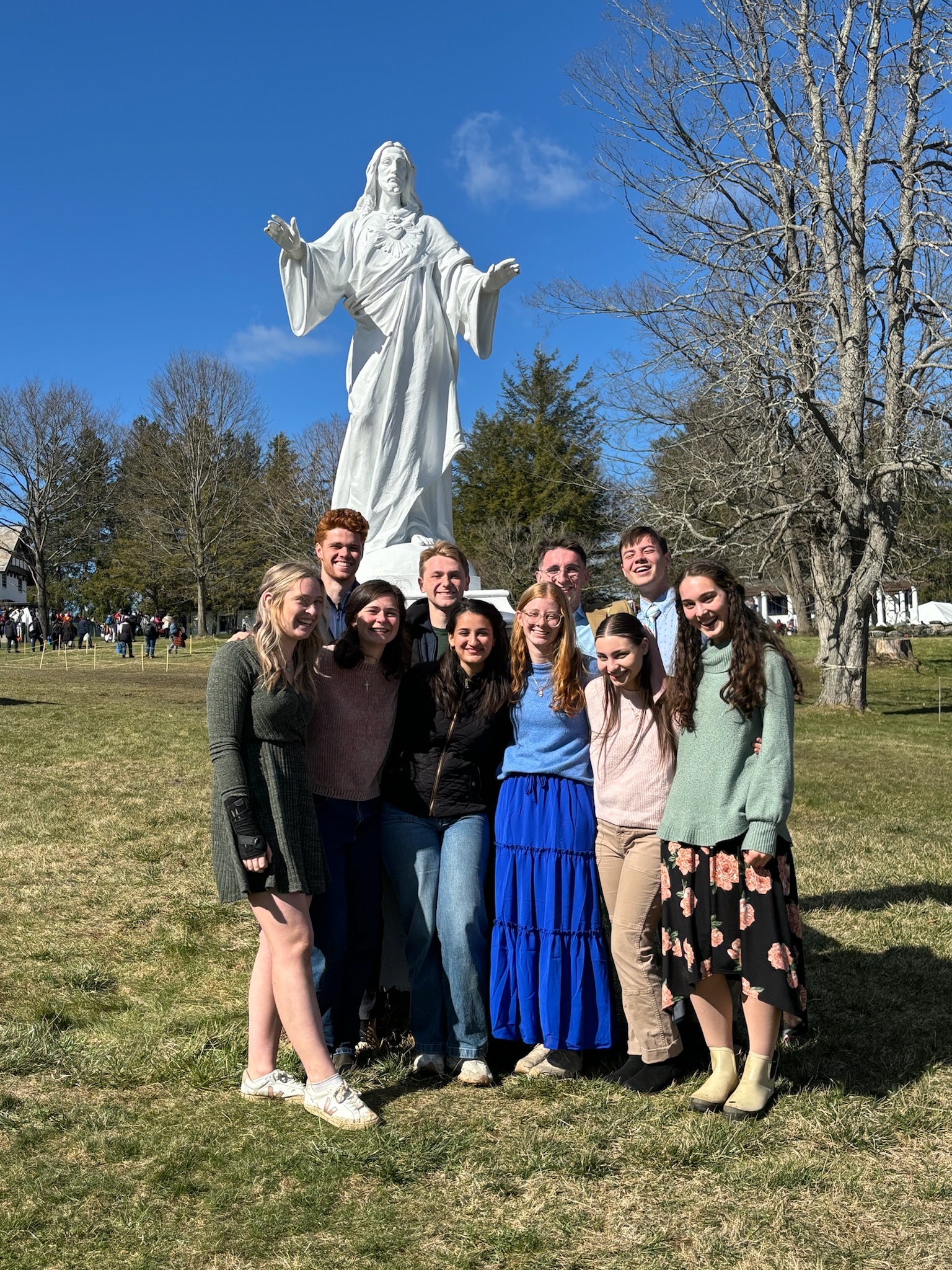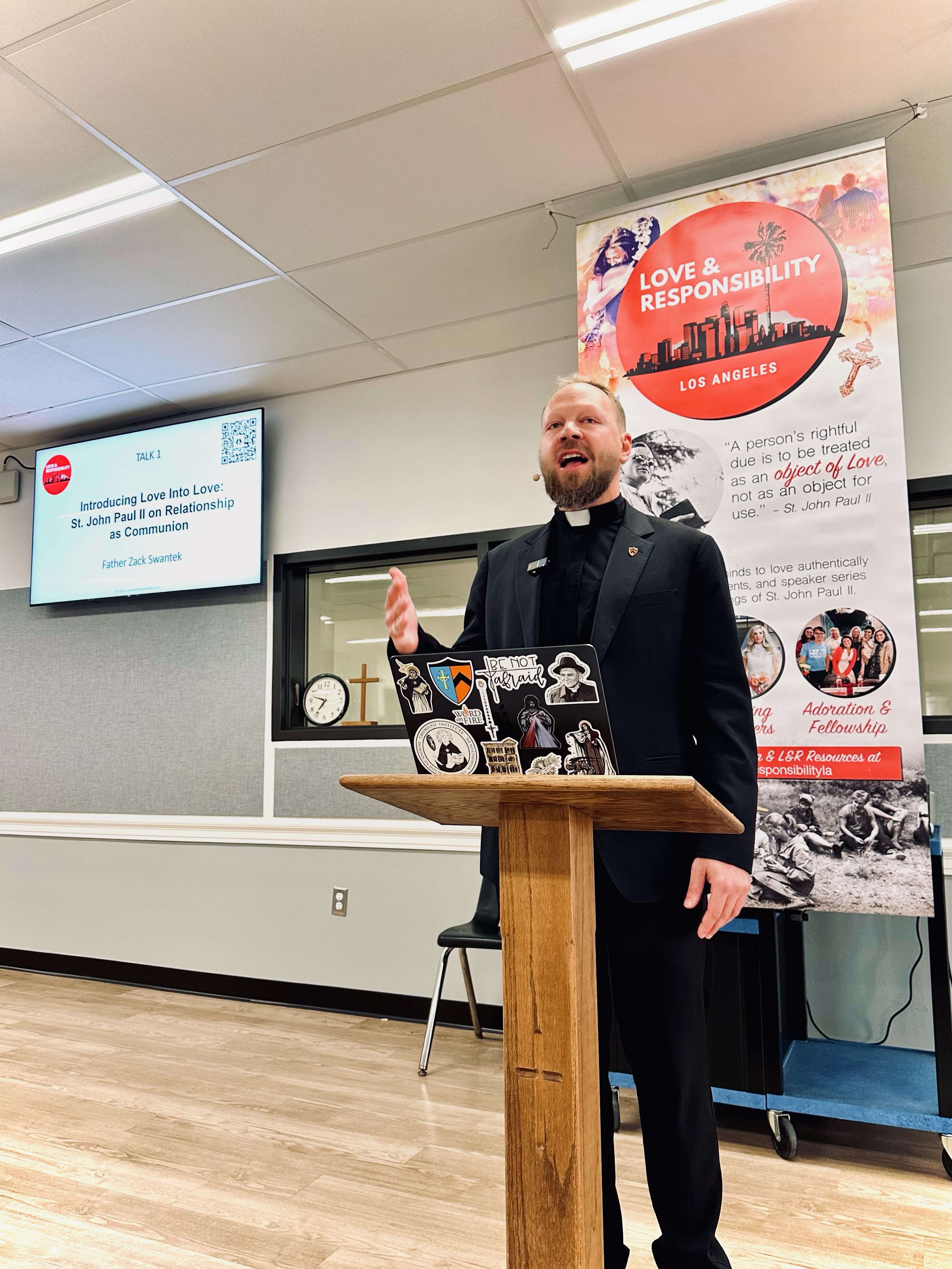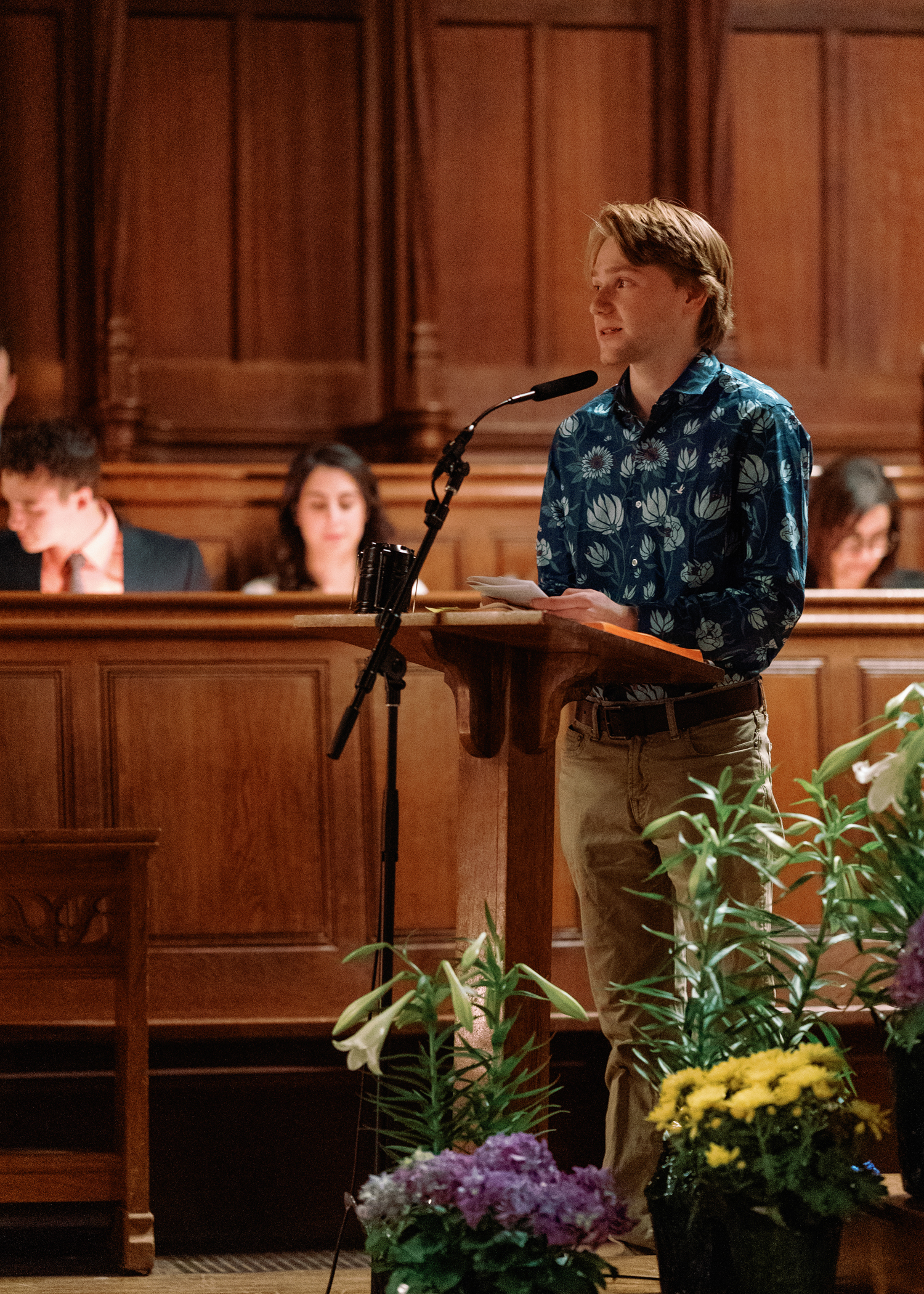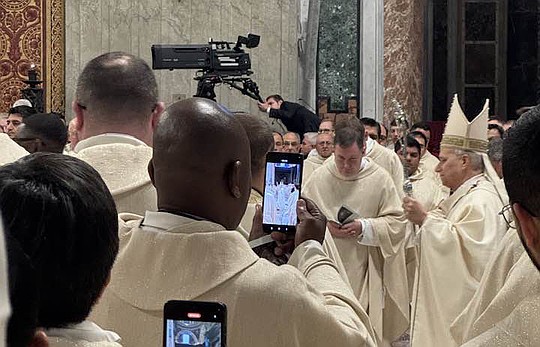Home away from Home
Princeton University’s Aquinas Institute brings Catholic community to the heart of campus
November 5, 2024 at 7:00 a.m.

As Catholic college students acclimate to university life, a community of like-minded peers can help anchor them to their faith. Catholic campus ministries provide a sort of spiritual lighthouse among the turbulence of competing secular ideologies, some of which run counter to Judeo-Christian values.
Setting the standard for this ministry is the Aquinas Institute at Princeton University, founded in 1928 and acting as a religious sanctuary of fellowship and worship for more than 1,200 undergraduate and graduate students, who comprise the largest self-identified religious group at the Princeton school.
The Aquinas Institute was recently featured in L’Osservatore Romano, newspaper of the Vatican, in an article penned by Luca Colacino, 2024 Princeton Theological Seminary graduate.
“In December, I met a journalist who works at L’Osservatore Romano [who] asked if I would write an article, and I immediately thought of the Catholic community in Princeton,” Colacino explained. “That was a story and a reality worth sharing.”
The article, “‘Friendship’ and ‘Freedom’: Signs of Hope from the Aquinas Institute in Princeton,” highlights Colacino’s personal experience as well as that of other students, noting that “In Princeton, I found a community of friends who want to bring their hearts and minds to the service of God and the Church for the sake of the world.”
Finding Common Ground
As a student in Princeton Theological Seminary, Colacino was looking for a Catholic community “where I could find friends with whom I could grow in my faith, in my relationship with God and in my love for others,” he attested.

Aquinas Institute students pose in front of a statue of the Sacred Heart of Jesus. Courtesy photo
Colacino, who hails originally from Italy, allowed his practice of the Catholic faith to lapse as a teenager, but returned to it with new zeal as an undergrad in Manchester, England. He then came to Princeton to study ecumenism at PTS and take doctoral courses at Princeton University. He first encountered the Aquinas Institute at Mass.
“I immediately realized that they did things a little bit differently,” he said. “It is the friendships I made, though, which allowed me to find freedom in being fully myself and learning more about how other people express their faith, experience their liturgy and live their Christian lives.”
Finding a “cultural attention to freedom and friendship” that seemed to set Aquinas apart from other Catholic ministries, Colacino embraced not only the discipline of living his Catholic faith on a daily basis, but also how that discipline could be integrated into his entire university experience.
“He was pleasantly surprised to find that his own faith grew tremendously through participation in the Aquinas Institute,” said Father Zachary Swantek, the ministry’s chaplain and director. “Readers of his article will see that our campus ministry is not about a program, but a person – Jesus Christ – and leading students into friendship with him.”
Colacino’s article expounds on the Institute’s ability to foster curiosity about the faith through seminars on Church teaching, engaging different opinions and life experiences, which “then allows students … to naturally become missionary disciples who know how to ‘speak the truth in love,’” he wrote.
“Yet I think that the students’ missionary zeal flows chiefly from living their Christian lives in the natural ways of freedom and friendship,” he continued. “Evangelisation [sic.] is marked by the sheer joy of sharing one’s whole life with one’s friends, trusting that God will do the rest.”
Transforming Hearts and Minds
Aquinas and the Catholic community have “been transformative for Princeton, especially because the rigorous academic schedule and daily grind can be challenging,” Father Swantek noted. “Spiritual direction, encouraging community and turning to God through prayer and the Mass all can been very helpful to the mental health of students,” he continued. “We humanize the college experience by helping students get in touch with the divine.”
“Because students learn that every person is created in the image of God,” Father Swantek said, “this impacts how they view themselves and how they treat others. They can disagree and listen to different viewpoints, but all with a sense of respect, allowing for the free exchange of ideas and openness to different perspectives.”
Since 2020, the Aquinas Institute has offered a for-credit course by Dr. Christopher Marcus-Gibson – “Happiness and Being Human in Catholic Thought” – which Father Swantek said has been extremely popular.

Father Zachary Swantek addresses an Oct. 19 gathering of young adults from California’s Archdiocese of Los Angeles and Diocese of Orange at the “Love and Responsibility Conference 2024: Developing Christ-centered Relationships.” Reflecting on the writings and message of Pope St. John Paul II, Father Swantek’s talk was entitled “Introducing Love into Love: St. John Paul II on ‘Relationship as Communion’.” Father Swantek shared similar thoughts Oct. 22 with the students of the Aquinas Institute, focused on St. Paul’s Letter to the Ephesians.
“We also offer supplemental seminars on various topics of theology, spirituality and philosophy for students who want to grow in their understanding of the faith and the riches of the Catholic intellectual tradition,” he pointed out.
Colacino graduated in spring from PTS with a master’s degree in theological studies. He has taken his enthusiasm for the faith with him to the Angelicum in Rome where he has begun studies in dogmatic theology.
“More than principles,” Colacino reflected, “I learned a way of life at the Aquinas Institute … one made of values such as talking with friends about what our Christian faith means in all areas of our lives … the habit of regular Adoration and Confession [and] attending daily Mass are things I want to carry on as I move onto a new chapter of my life.”
Friendship and Visible Presence
Colacino’s fellow Aquinas students, many of whom remain at Princeton University, echo his fondness for the faith community and its guiding force.
“In making friendships [there], I got more and more involved; I joined a Bible study, and attended seminars where Father Zack and others teach us about the Catholic faith,” said Roberto Lachner, class of 2026. “Not only did it answer a lot of doubts about my faith, it introduced me to the concept that being Catholic can’t be something you do one hour a week … but to have a community.”
He describes his Aquinas friendships as different “because Christ is as the center. … I think from the Catholic perspective, we’re called to be the salt of the world – so even if there’s only a little bit of us, we add flavor to every environment.”
Sophomore Abby Readlinger met her three best friends at an Aquinas Institute Bible study. She joined Lachner in crediting Father Swantek for making the group activities easily accessible.
“Aquinas Institute is very present on campus – daily Mass right in the University Chapel, the Blessed Sacrament is always there; there are a lot of get-togethers just for fellowship… I think there’s a very welcome attitude toward students who might be otherwise intimidated.”

Roberto Lachner, Princeton University Class of 2026, reads at a Mass in the University Chapel. Courtesy photo
“The resources Aquinas provides to students include not just formation through seminars and reading groups, but less formal opportunities … I grew in my closest friendships through conversations that began [there],” said Mariana Altomare, class of 2025. She finds the community set apart from what she has observed at other schools “by a particular desire to go ever deeper and further into our own faith and formation … and then take this out into the rest of campus in all our relationships.”
The importance of this Catholic presence, all agreed, cannot be overstated.
“Catholic culture needs to be present in universities not to get involved in worldly culture wars, but to be a sign of hope for many students looking for truth and justice, seeking to make a difference in the world, and questioning what is the purpose of their life,” Colacino explained. “The presence of Catholics in universities is a presence of love that always shows up in genuine friendship and authentic freedom. In this way, Catholic culture prepares the way for everyone to find truth and justice in God’s eternal, enduring, and merciful love.”
Altomare pointed out that most students are at a particularly decisive time of life, “but many motivations come from a place of fear, anxiety, and mounting pressures. It is also a place plagued by loneliness and isolation. In what is a relatively small, dense community of young people trying to live good lives, I think the university environment offers one of the greatest opportunities to approach the people around us with a radical love that can transform campus into a more charitable place.”
When people see the students actively practicing their faith, “they have that thirst and desire for something greater than themselves,” Lachner said. “It’s really special because people come and ask why you believe what you believe, from a place of genuine curiosity … I’ve had a lot of people ask if they can come to Mass with me … some are Christian, some never religious, but they see us living our faith every day, and people recognize the beauty and truth in it.”
Readlinger found herself inviting friends to Mass on campus during Lent and Holy Week, many of whom were simply curious about the Church. One of her best friends was even confirmed at the Easter Vigil.
“As a Catholic, we’re called to bring people in around us and to help them in their faith. At Aquinas there’s an atmosphere of ‘This is my belief and why I believe it, and I’m going to welcome you and share it with you,’” Readlinger said. “Seeking and finding truth – that’s the point of learning; you don’t actually learn anything if you’re not willing to listen and hear where other people are coming from … regardless of faith affiliation, there needs to be some sort of outlet to express who you are, your beliefs, and have others challenge those.”
The Church needs quality Catholic journalism now more than ever. Please consider supporting this work by signing up for a SUBSCRIPTION (click HERE) or making a DONATION to The Monitor (click HERE). Thank you for your support.
Related Stories
Thursday, January 08, 2026
E-Editions
Events
As Catholic college students acclimate to university life, a community of like-minded peers can help anchor them to their faith. Catholic campus ministries provide a sort of spiritual lighthouse among the turbulence of competing secular ideologies, some of which run counter to Judeo-Christian values.
Setting the standard for this ministry is the Aquinas Institute at Princeton University, founded in 1928 and acting as a religious sanctuary of fellowship and worship for more than 1,200 undergraduate and graduate students, who comprise the largest self-identified religious group at the Princeton school.
The Aquinas Institute was recently featured in L’Osservatore Romano, newspaper of the Vatican, in an article penned by Luca Colacino, 2024 Princeton Theological Seminary graduate.
“In December, I met a journalist who works at L’Osservatore Romano [who] asked if I would write an article, and I immediately thought of the Catholic community in Princeton,” Colacino explained. “That was a story and a reality worth sharing.”
The article, “‘Friendship’ and ‘Freedom’: Signs of Hope from the Aquinas Institute in Princeton,” highlights Colacino’s personal experience as well as that of other students, noting that “In Princeton, I found a community of friends who want to bring their hearts and minds to the service of God and the Church for the sake of the world.”
Finding Common Ground
As a student in Princeton Theological Seminary, Colacino was looking for a Catholic community “where I could find friends with whom I could grow in my faith, in my relationship with God and in my love for others,” he attested.

Aquinas Institute students pose in front of a statue of the Sacred Heart of Jesus. Courtesy photo
Colacino, who hails originally from Italy, allowed his practice of the Catholic faith to lapse as a teenager, but returned to it with new zeal as an undergrad in Manchester, England. He then came to Princeton to study ecumenism at PTS and take doctoral courses at Princeton University. He first encountered the Aquinas Institute at Mass.
“I immediately realized that they did things a little bit differently,” he said. “It is the friendships I made, though, which allowed me to find freedom in being fully myself and learning more about how other people express their faith, experience their liturgy and live their Christian lives.”
Finding a “cultural attention to freedom and friendship” that seemed to set Aquinas apart from other Catholic ministries, Colacino embraced not only the discipline of living his Catholic faith on a daily basis, but also how that discipline could be integrated into his entire university experience.
“He was pleasantly surprised to find that his own faith grew tremendously through participation in the Aquinas Institute,” said Father Zachary Swantek, the ministry’s chaplain and director. “Readers of his article will see that our campus ministry is not about a program, but a person – Jesus Christ – and leading students into friendship with him.”
Colacino’s article expounds on the Institute’s ability to foster curiosity about the faith through seminars on Church teaching, engaging different opinions and life experiences, which “then allows students … to naturally become missionary disciples who know how to ‘speak the truth in love,’” he wrote.
“Yet I think that the students’ missionary zeal flows chiefly from living their Christian lives in the natural ways of freedom and friendship,” he continued. “Evangelisation [sic.] is marked by the sheer joy of sharing one’s whole life with one’s friends, trusting that God will do the rest.”
Transforming Hearts and Minds
Aquinas and the Catholic community have “been transformative for Princeton, especially because the rigorous academic schedule and daily grind can be challenging,” Father Swantek noted. “Spiritual direction, encouraging community and turning to God through prayer and the Mass all can been very helpful to the mental health of students,” he continued. “We humanize the college experience by helping students get in touch with the divine.”
“Because students learn that every person is created in the image of God,” Father Swantek said, “this impacts how they view themselves and how they treat others. They can disagree and listen to different viewpoints, but all with a sense of respect, allowing for the free exchange of ideas and openness to different perspectives.”
Since 2020, the Aquinas Institute has offered a for-credit course by Dr. Christopher Marcus-Gibson – “Happiness and Being Human in Catholic Thought” – which Father Swantek said has been extremely popular.

Father Zachary Swantek addresses an Oct. 19 gathering of young adults from California’s Archdiocese of Los Angeles and Diocese of Orange at the “Love and Responsibility Conference 2024: Developing Christ-centered Relationships.” Reflecting on the writings and message of Pope St. John Paul II, Father Swantek’s talk was entitled “Introducing Love into Love: St. John Paul II on ‘Relationship as Communion’.” Father Swantek shared similar thoughts Oct. 22 with the students of the Aquinas Institute, focused on St. Paul’s Letter to the Ephesians.
“We also offer supplemental seminars on various topics of theology, spirituality and philosophy for students who want to grow in their understanding of the faith and the riches of the Catholic intellectual tradition,” he pointed out.
Colacino graduated in spring from PTS with a master’s degree in theological studies. He has taken his enthusiasm for the faith with him to the Angelicum in Rome where he has begun studies in dogmatic theology.
“More than principles,” Colacino reflected, “I learned a way of life at the Aquinas Institute … one made of values such as talking with friends about what our Christian faith means in all areas of our lives … the habit of regular Adoration and Confession [and] attending daily Mass are things I want to carry on as I move onto a new chapter of my life.”
Friendship and Visible Presence
Colacino’s fellow Aquinas students, many of whom remain at Princeton University, echo his fondness for the faith community and its guiding force.
“In making friendships [there], I got more and more involved; I joined a Bible study, and attended seminars where Father Zack and others teach us about the Catholic faith,” said Roberto Lachner, class of 2026. “Not only did it answer a lot of doubts about my faith, it introduced me to the concept that being Catholic can’t be something you do one hour a week … but to have a community.”
He describes his Aquinas friendships as different “because Christ is as the center. … I think from the Catholic perspective, we’re called to be the salt of the world – so even if there’s only a little bit of us, we add flavor to every environment.”
Sophomore Abby Readlinger met her three best friends at an Aquinas Institute Bible study. She joined Lachner in crediting Father Swantek for making the group activities easily accessible.
“Aquinas Institute is very present on campus – daily Mass right in the University Chapel, the Blessed Sacrament is always there; there are a lot of get-togethers just for fellowship… I think there’s a very welcome attitude toward students who might be otherwise intimidated.”

Roberto Lachner, Princeton University Class of 2026, reads at a Mass in the University Chapel. Courtesy photo
“The resources Aquinas provides to students include not just formation through seminars and reading groups, but less formal opportunities … I grew in my closest friendships through conversations that began [there],” said Mariana Altomare, class of 2025. She finds the community set apart from what she has observed at other schools “by a particular desire to go ever deeper and further into our own faith and formation … and then take this out into the rest of campus in all our relationships.”
The importance of this Catholic presence, all agreed, cannot be overstated.
“Catholic culture needs to be present in universities not to get involved in worldly culture wars, but to be a sign of hope for many students looking for truth and justice, seeking to make a difference in the world, and questioning what is the purpose of their life,” Colacino explained. “The presence of Catholics in universities is a presence of love that always shows up in genuine friendship and authentic freedom. In this way, Catholic culture prepares the way for everyone to find truth and justice in God’s eternal, enduring, and merciful love.”
Altomare pointed out that most students are at a particularly decisive time of life, “but many motivations come from a place of fear, anxiety, and mounting pressures. It is also a place plagued by loneliness and isolation. In what is a relatively small, dense community of young people trying to live good lives, I think the university environment offers one of the greatest opportunities to approach the people around us with a radical love that can transform campus into a more charitable place.”
When people see the students actively practicing their faith, “they have that thirst and desire for something greater than themselves,” Lachner said. “It’s really special because people come and ask why you believe what you believe, from a place of genuine curiosity … I’ve had a lot of people ask if they can come to Mass with me … some are Christian, some never religious, but they see us living our faith every day, and people recognize the beauty and truth in it.”
Readlinger found herself inviting friends to Mass on campus during Lent and Holy Week, many of whom were simply curious about the Church. One of her best friends was even confirmed at the Easter Vigil.
“As a Catholic, we’re called to bring people in around us and to help them in their faith. At Aquinas there’s an atmosphere of ‘This is my belief and why I believe it, and I’m going to welcome you and share it with you,’” Readlinger said. “Seeking and finding truth – that’s the point of learning; you don’t actually learn anything if you’re not willing to listen and hear where other people are coming from … regardless of faith affiliation, there needs to be some sort of outlet to express who you are, your beliefs, and have others challenge those.”
The Church needs quality Catholic journalism now more than ever. Please consider supporting this work by signing up for a SUBSCRIPTION (click HERE) or making a DONATION to The Monitor (click HERE). Thank you for your support.










